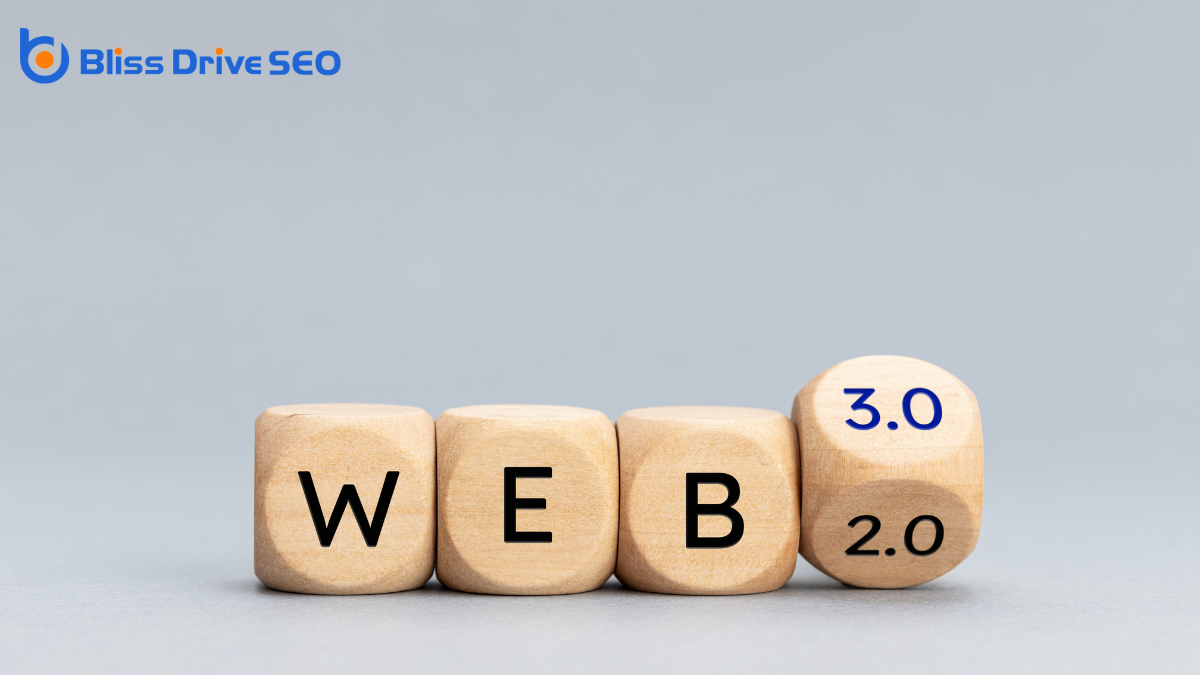Digital Marketing Services
Learn More About Us

So, you're curious about Web3 and what it really means? Imagine a digital world where you truly own your data and control your online identity, quite a shift from the centralized systems we're used to. Web3 represents this new era, using blockchain technology to create a more decentralized internet. But how exactly does it transform your online experience, and what are the implications for privacy and security? These questions only scratch the surface. Let's explore how Web3 might redefine your interaction with the digital world, offering possibilities that aren't just theoretical but already unfolding.
In the domain of digital evolution, Web3 represents a paradigm shift toward a decentralized internet, where power is distributed rather than centralized. You're moving into an era where users like yourself gain greater control over your digital interactions.
In Web3, the blockchain plays a vital role, providing a transparent and secure foundation. This technology guarantees that transactions and interactions are recorded immutably, making them tamper-proof and trustworthy.
Think of Web3 as an internet where you own and manage your data. Unlike Web2, where central platforms often control your information, Web3 empowers you with true ownership.
Smart contracts, a key component, automate agreements without needing intermediaries. These contracts execute when conditions are met, ensuring efficiency and reducing reliance on third parties.
In Web3, decentralized applications (dApps) are the norm. These are applications that run on a blockchain, ensuring that no single entity can control or alter their operations. This fosters a more open and fair digital landscape.
As you explore Web3, you'll find that it's all about giving you the reins, enabling more secure, private, and equitable online experiences. Understanding these basics is your first step toward embracing this transformative technology.

As you explore the shift from Web2 to Web3, you'll notice a strong focus on decentralization and blockchain technology, which aim to give users more power and control.
This evolution brings enhanced user privacy control, allowing you to manage your data and digital identity more securely.
Web3's core innovation lies in its focus on decentralization, primarily driven by blockchain technology, which marks a significant shift from the centralized structures of Web2. In Web2, large corporations control vast amounts of data and digital interactions. You often rely on a few powerful entities to access services, which can limit transparency and control.
However, Web3 aims to redistribute that power back to individuals and communities by using decentralized networks.
Blockchain technology plays a vital role in this transformation. It operates as a distributed ledger, ensuring that every transaction is recorded across a network of computers rather than a single server. This setup enhances transparency and security because no single entity has control over the entire network. You gain the ability to verify and trust transactions without relying on intermediaries.
Moreover, decentralization empowers you to participate directly in various digital ecosystems. By eliminating gatekeepers, Web3 enables peer-to-peer interactions, creating opportunities for new business models and innovations.
You can engage in decentralized finance, own digital assets like NFTs, and contribute to decentralized autonomous organizations (DAOs). Understanding these principles helps you grasp the potential of Web3 in reshaping how you interact online.
Decentralization not only redistributes power but also considerably enhances user privacy control. In the Web3 world, you're not just a passive participant; you have the tools to protect your data like never before.
Web3's decentralized nature means that your personal information isn't stored in one centralized location, making it much harder for hackers to access and misuse it. This shift empowers you to manage your digital identity with precision and autonomy.
Consider these key aspects of enhanced privacy in Web3:
In Web3, you're not just securing your data; you're taking back control. By leveraging decentralized networks and advanced technologies, you can navigate the digital landscape with confidence.
This evolution from Web2 to Web3 marks a significant leap forward in user privacy and security.
In today's rapidly evolving digital landscape, Web3 stands out by leveraging a suite of cutting-edge technologies that promise to revolutionize the way we interact online. At the heart of Web3 is blockchain technology, which provides a decentralized and immutable ledger for secure transactions.
You'll find that blockchain guarantees transparency and trust among users, as every transaction is recorded and can't be altered.
Another key technology is smart contracts, which are self-executing contracts with the terms of the agreement directly written into code. These contracts automatically enforce and execute actions when certain conditions are met, eliminating the need for intermediaries and reducing transaction costs.
Cryptocurrencies, like Bitcoin and Ethereum, play a vital role too. They're not just forms of digital money but also act as incentives for users to participate in the network, fueling the decentralized economy.
Moreover, decentralized applications (dApps) are built on blockchain and operate without a central authority. They offerThe specific product or service being promoted by affiliates. you more control and foster peer-to-peer interactions.
Finally, distributed storage solutions, such as IPFS (InterPlanetary File System), allow you to store and share data more efficiently, reducing reliance on centralized servers.
Together, these technologies shape the promising future of Web3.

With Web3, you gain true digital ownership by having direct control over your assets without needing a central authority.
This shift removes traditional gatekeepers, giving you more freedom and security.
Transparent transaction processes guarantee you can track and verify every exchange, building trust in the digital ecosystem.
Amid the rapid evolution of digital landscapes, empowering digital ownership stands out as a transformative shift, revolutionizing how you interact with online assets.
Web3 technology places power directly into your hands, allowing you to truly own your digital content. It's not just about access anymore; it's about control and security over your digital belongings.
Imagine having the keys to your digital house without needing to rely on a landlord. That's the promise of Web3: you're no longer just a user but an owner.
In this new paradigm, your digital assets, whether they're art, music, or data, exist on decentralized networks. This means you control who accesses them and how they're used.
Here's what facilitates your ownership:
Picture a bustling marketplace where you hold the reins, deciding who gets access to your goods and services. In the world of Web3, this is the power of decentralization and user control.
You're no longer at the mercy of central authorities that dictate terms and conditions. Instead, you gain autonomy over your online interactions, data, and digital assets.
Decentralization means that control is distributed across a network, removing the need for a single governing entity. This shift empowers you to make decisions and manage your online presence without interference.
Imagine having the ability to transact, interact, and share freely with protocols that respect your choices and privacy.
In Web3, you interact directly with peers through blockchain technology, which acts as a decentralized ledger. This gives you more trust and security, as you're not relying on third parties that might misuse your data.
You set the rules, granting permissions based on your preferences and needs.
A key advantage of Web3 is its transparent transaction processes, which enhance decentralization and user control. You'll find that every transaction is recorded on a public ledger, ensuring that information is accessible and traceable.
This transparency eliminates the need for intermediaries, allowing you to engage directly with others in the network. As a result, you gain more control over your data and assets, reducing reliance on centralized authorities.
Web3 empowers you by providing:
In light of growing concerns over digital privacy, Web3 promises significant advancements in privacy and security that you won't want to miss. Imagine a digital world where your data stays yours, and you control who accesses it. Web3 aims to make this a reality by using decentralized networks that eliminate the need for intermediaries. These networks guarantee that your personal information isn't stored on centralized servers that are vulnerable to hacks.
Web3 uses blockchain technology to provide you with enhanced security. Transactions are encrypted and distributed across multiple nodes, making it incredibly difficult for hackers to tamper with information. This means your data is safer and less likely to be compromised.
Moreover, Web3 introduces the concept of self-sovereign identity, allowing you to manage your digital identity independently. With this, you decide which pieces of your information to share and who gets to see it.
Smart contracts add another layer of security by automating agreements and verifying they're executed only when predefined conditions are met, reducing human error and fraud.
Web3's focus on privacy and security empowers you to navigate the digital world with greater confidence, knowing you have control over your personal data.
Embracing Web3 technologies is already transforming various industries by offering decentralized solutions that enhance efficiency and transparency.
In finance, decentralized finance (DeFi) is reshaping how you interact with money. By bypassing traditional banks, DeFi platforms allow you to lend, borrow, and earn interest on cryptocurrencies without intermediaries. This not only reduces costs but also broadens access to financial services for those previously underserved.
In supply chain management, Web3 guarantees every step of a product's journey is tracked and verified on a blockchain. This creates a tamper-proof record, allowing you to verify product authenticity and quality. Businesses benefit from increased trust and reduced fraud, while consumers enjoy greater transparency.
Web3 is also revolutionizing digital identity. Instead of relying on centralized databases, you can store and manage your identity securely on the blockchain. This empowers you to control your personal data, sharing only what's necessary with service providers.
These applications demonstrate Web3's potential to create more equitable and efficient systems across various sectors.

As Web3 technologies continue to reshape existing systems, their future impact promises even more profound changes across industries.
You'll notice how decentralization fosters greater transparency and trust, making traditional intermediaries less relevant. Imagine a world where financial transactions are secure and instantaneous without needing banks or brokers. This shift could save time and reduce costs for consumers and businesses alike.
In addition, you'll see Web3 transforming the way you own and control digital assets. With non-fungible tokens (NFTs) and blockchain technology, you can truly own digital art, music, and even virtual real estate. This newfound ownership extends to your personal data, empowering you to decide who accesses it and how it's used.
Another exciting development is the potential for decentralized autonomous organizations (DAOs). These entities operate without centralized leadership, giving you and other stakeholders direct control over decision-making processes. This could revolutionize governance structures in companies and communities, promoting democratic participation and accountability.
Finally, Web3's impact on the internet itself can't be overstated. By enabling a more open and equitable digital landscape, you'll witness the birth of new opportunities for innovation and collaboration on a global scale.
In Web3, you're stepping into a future where you have true control over your online presence. Unlike the centralized Web2, Web3 empowers you with decentralization, letting you own your data and digital assets. Enhanced privacy, security, and transparency are at your fingertips, thanks to blockchain technology. As real-world applications grow, you'll witness an open digital landscape that prioritizes your autonomy. Embrace Web3's evolution, where your online experience is yours to shape.
